外教面试问题 - 双语版
国际学校老师面试题目(3篇)

第1篇一、个人背景与职业发展1. 请您简单介绍一下自己,包括您的教育背景、工作经验以及为什么选择成为国际学校老师。
2. 您在过去的教育教学中,有哪些特别的经历或成就?能否举例说明?3. 您认为作为一名国际学校老师,最重要的素质是什么?您具备这些素质吗?4. 您如何理解国际教育的理念?在您的教育实践中,如何体现这一理念?5. 您在以往的教育教学中,遇到过哪些挑战?您是如何克服这些挑战的?6. 您如何看待跨文化教育?在您的教学过程中,如何促进学生的跨文化交流?7. 您如何平衡工作与个人生活?在忙碌的工作中,您如何保持身心健康?8. 您认为作为一名教师,终身学习的重要性体现在哪些方面?您是如何实现终身学习的?9. 您对未来国际教育的发展有何期待?您认为自己在其中可以扮演什么角色?10. 您如何理解教师与学生、家长、学校之间的关系?在您的教学实践中,如何处理好这些关系?二、教学方法与课程设计11. 您能举例说明一个成功的课堂活动或教学案例吗?在活动中,您是如何引导学生学习的?12. 您如何设计一堂有趣的课程?在课程设计中,您如何体现学生的主体地位?13. 您在教学中如何运用信息技术?能否举例说明一个成功的案例?14. 您如何看待学生个性化学习?在教学中,您如何满足不同学生的学习需求?15. 您如何评估学生的学习成果?在评估过程中,您会采用哪些方法和工具?16. 您如何处理学生在学习过程中遇到的问题?您认为教师在这个过程中的角色是什么?17. 您如何引导学生进行自主学习?在自主学习过程中,您会提供哪些支持和指导?18. 您在教学中如何培养学生的批判性思维和创新能力?能否举例说明?19. 您如何看待跨学科教学?在您的教学实践中,如何实现跨学科教学?20. 您如何设计课程评估体系?在评估过程中,您如何确保评估的公正性和客观性?三、学生管理与班级管理21. 您如何建立良好的师生关系?在班级管理中,您如何关注每个学生的成长?22. 您如何处理学生之间的矛盾和冲突?在处理这类问题时,您会遵循哪些原则?23. 您如何关注学生的心理健康?在学生遇到心理问题时,您会采取哪些措施?24. 您如何引导学生树立正确的价值观和人生观?在教学中,您会传递哪些正能量?25. 您如何与家长保持良好的沟通?在学生教育过程中,您会与家长合作解决哪些问题?26. 您如何组织班级活动?在活动中,您如何激发学生的参与热情?27. 您如何看待学生的个性化发展?在班级管理中,您如何尊重学生的个性?28. 您如何培养学生的团队合作精神?在教学中,您会采用哪些方法和策略?29. 您如何培养学生的领导力?在班级管理中,您会为学生提供哪些机会?30. 您如何应对突发事件?在班级管理中,您会采取哪些措施确保学生的安全?四、国际学校特色与教学资源31. 您如何将国际学校的特色融入教学实践?在教学中,您会采用哪些具体措施?32. 您如何看待国际学校的多元文化环境?在教学中,您如何引导学生理解和尊重不同文化?33. 您如何利用国际学校的资源为学生提供更好的教育体验?能否举例说明?34. 您如何看待国际学校的国际视野?在教学中,您如何培养学生的国际竞争力?35. 您如何与国际学校的其他部门合作,共同促进学生全面发展?36. 您如何看待国际学校的国际化课程体系?在教学中,您如何帮助学生适应这一体系?37. 您如何关注学生的国际交流机会?在教学中,您会为学生提供哪些支持?38. 您如何看待国际学校的师资队伍?在您的教学实践中,您如何与同事相互学习、共同进步?39. 您如何看待国际学校的校园文化?在教学中,您如何培养学生的校园文化意识?40. 您如何为国际学校的可持续发展贡献自己的力量?在您的教学实践中,您会关注哪些方面?通过以上面试题目,面试官可以全面了解应聘者的教育理念、教学方法、学生管理能力以及国际学校特色等方面的综合素质。
双语学校面试题
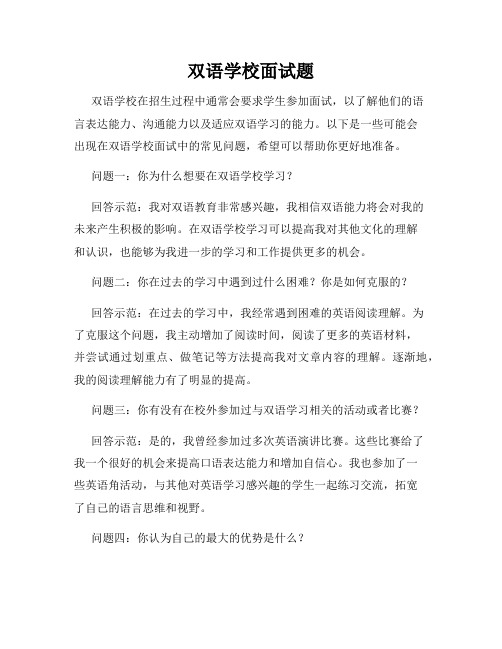
双语学校面试题双语学校在招生过程中通常会要求学生参加面试,以了解他们的语言表达能力、沟通能力以及适应双语学习的能力。
以下是一些可能会出现在双语学校面试中的常见问题,希望可以帮助你更好地准备。
问题一:你为什么想要在双语学校学习?回答示范:我对双语教育非常感兴趣,我相信双语能力将会对我的未来产生积极的影响。
在双语学校学习可以提高我对其他文化的理解和认识,也能够为我进一步的学习和工作提供更多的机会。
问题二:你在过去的学习中遇到过什么困难?你是如何克服的?回答示范:在过去的学习中,我经常遇到困难的英语阅读理解。
为了克服这个问题,我主动增加了阅读时间,阅读了更多的英语材料,并尝试通过划重点、做笔记等方法提高我对文章内容的理解。
逐渐地,我的阅读理解能力有了明显的提高。
问题三:你有没有在校外参加过与双语学习相关的活动或者比赛?回答示范:是的,我曾经参加过多次英语演讲比赛。
这些比赛给了我一个很好的机会来提高口语表达能力和增加自信心。
我也参加了一些英语角活动,与其他对英语学习感兴趣的学生一起练习交流,拓宽了自己的语言思维和视野。
问题四:你认为自己的最大的优势是什么?回答示范:我认为自己的最大优势是自律和坚持。
我在学习中始终保持高度自律,制定并遵守学习计划,这使我能够保持良好的学习习惯和高效率的学习状态。
同时,我也在坚持不懈地追求自己的学业目标,不轻易放弃。
问题五:你在学习中遇到的最大挑战是什么?你将如何面对这个挑战?回答示范:在学习中,我最大的挑战是对数学的兴趣不高。
为了克服这个挑战,我会寻求更多的帮助,与老师和同学一起讨论问题,加入数学学习小组互相学习帮助。
我也会积极改变自己对数学的态度,尝试从不同的角度去理解和应用数学知识。
问题六:你如何管理学习与兴趣爱好之间的平衡?回答示范:我认为学习和兴趣爱好之间的平衡非常重要。
我会制定合理的时间安排,将学习和兴趣爱好纳入其中。
在学习期间,我会保持专注和高效率;在兴趣爱好时间,我会全身心地放松和享受。
国际双语学校面试题
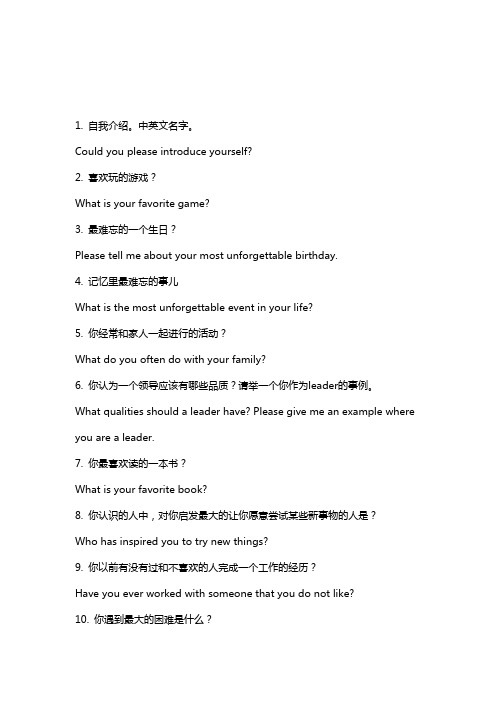
1. 自我介绍。
中英文名字。
Could you please introduce yourself?2. 喜欢玩的游戏?What is your favorite game?3. 最难忘的一个生日?Please tell me about your most unforgettable birthday.4. 记忆里最难忘的事儿What is the most unforgettable event in your life?5. 你经常和家人一起进行的活动?What do you often do with your family?6. 你认为一个领导应该有哪些品质?请举一个你作为leader的事例。
What qualities should a leader have? Please give me an example where you are a leader.7. 你最喜欢读的一本书?What is your favorite book?8. 你认识的人中,对你启发最大的让你愿意尝试某些新事物的人是?Who has inspired you to try new things?9. 你以前有没有过和不喜欢的人完成一个工作的经历?Have you ever worked with someone that you do not like?10. 你遇到最大的困难是什么?What is the greatest difficulty that you have ever met?11. 对你影响最深刻的一个人?Who has the greatest influence on you?12. 说出一个你鼓励别人的经历?Have you ever encouraged another person?13. 最伟大的科技是什么?What is the greatest technology / invention?14. 你最喜欢和朋友一起做什么?What do you like to do with your friends?15. 最近看了什么电影?喜欢里面什么角色?为什么?What movies have you watched recently? Which character in the movie do you like? Why?16. 你晚餐最喜欢吃什么?为什么?你最不喜欢吃什么?What would you have for dinner? Why? What is your least favorite food?17. 你平时喜欢什么活动?为什么?What activities do you enjoy doing? Why?18. 你收到过最好的礼物是什么?为什么?What is the best present that you have received? Why?19. 你觉得有意思的一个人?Please tell me an interesting person that you know.20. 描述一次工作很累的经历?Could you please describe a painstaking work that you did.21. 你是如何放松的?How do you relax?22. 你认为科技对你的影响是什么?How does technology influence you?23. 你喜欢哪一个作者?为什么?Who is your favorite writer? Why?24. 过去几年当中令你最开心的事情是什么?In the past years, what is the happiest event for you?25. 你喜欢什么动物,为什么?What animals do you like? Why?26. 讲一次旅游的经历。
外教面试问题---双语版
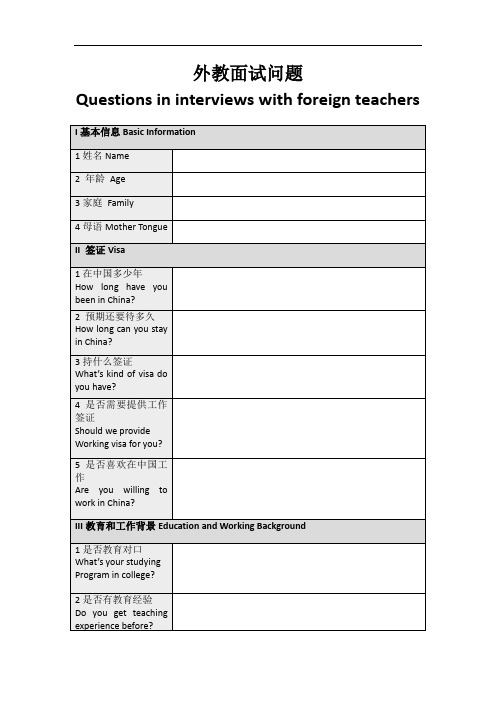
外教面试问题Questions in interviews with foreign teachers外教招聘面试流程Interview Process面试前的准备—阅读简历Before an interview—Screening Resume了解应聘者的意向,比如想要找全职还是兼职,学校还是一对一外教;Find the candidate候选人intention. Does she want a full-time orpart-time job, tutoring or teaching?了解应聘者的资历,可根据其国籍、教学经验等;Estimate the candidate value, mainly depending on nationality and teaching experience.找出需要在面试中询问的问题。
Made the questions to be asked during the interview.注意Note :在阅读完简历之后,要给出应聘者一个大致的定位。
After reading the resume, the interview should get a general evaluation to the candidate.第一部分寒暄Part One Greetings在自我介绍之后可以聊一些轻松的话题,例如:来中国多少时间了?在中国呆的还开心吗?This part is mainly to warm up. Following the self-introduction can be a small relaxing talk.注意Note :时间不必太长,1-2分钟即可。
It should not take too long. Around 1-2 minutes is suitable.第二部分了解目前的工作状态Part Two What do you do now?这一部分主要是为了考察其稳定性,以及对这份工作的态度和目的,可结合申请表上填写的内容询问。
问外教的30个问题1
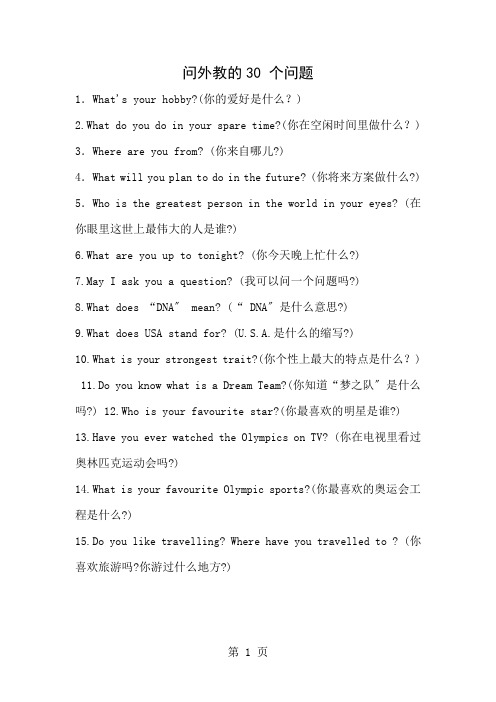
问外教的30 个问题1.What's your hobby?(你的爱好是什么?)2.What do you do in your spare time?(你在空闲时间里做什么?) 3.Where are you from? (你来自哪儿?)4.What will you plan to do in the future? (你将来方案做什么?) 5.Who is the greatest person in the world in your eyes? (在你眼里这世上最伟大的人是谁?)6.What are you up to tonight? (你今天晚上忙什么?)7.May I ask you a question? (我可以问一个问题吗?)8.What does “DNA〞mean? (“ DNA〞是什么意思?)9.What does USA stand for? (U.S.A.是什么的缩写?)10.What is your strongest trait?(你个性上最大的特点是什么?)11.Do you know what is a Dream Team?(你知道“梦之队〞是什么吗?) 12.Who is your favourite star?(你最喜欢的明星是谁?) 13.Have you ever watched the Olympics on TV? (你在电视里看过奥林匹克运动会吗?)14.What is your favourite Olympic sports?(你最喜欢的奥运会工程是什么?)15.Do you like travelling? Where have you travelled to ? (你喜欢旅游吗?你游过什么地方?)16.What famous buildings do you know?(你知道哪些著名的建筑?)17.What is your favourite colour and fruit?(你最喜欢的颜色和水果是什么?)18.What do you usually eat for lunch and supper? (通常情况下,你的晚餐和午餐都吃什么?)19.Do you know how to cook?What do you like to cook? (你知道怎么做饭吗?你喜欢做什么饭菜?)20.Have you ever helped or given money to someone?Is it important to help people who don’t have enough money? (你曾帮助或捐赠过钱给他人吗?帮助那些穷人是重要的吗?)21.How do you feel when you catch a cold?(你感冒后的感觉是怎样的?)22.Where do you come from?(你来自哪儿?)23.Do you like China? Why?(你喜欢中国吗?为什么?)24.Have you ever travelled to Dafosi and Matisi?(你游过大佛寺和马蹄寺吗?)25.How do you think of the Runquanhu park?(你认为润泉湖公园怎么样?)26.What do you know about dinosaurs and UFO? (你知道的恐龙和飞碟的知识是什么?)27.What do you want to be in your childhood?(在你童年的时候你想成为什么人?)29.How many clubs are there in your school?(你们学校有多少俱乐部?)30.Would you like to teach us an English song?(你愿意教我们一首英语歌曲吗?)。
外教面试问题
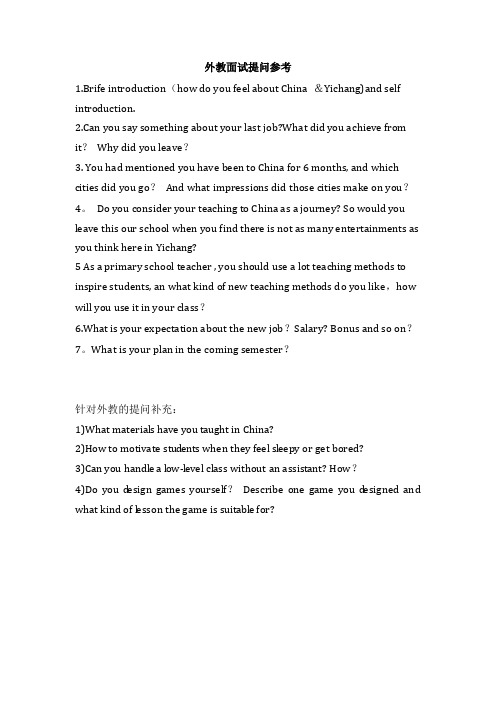
外教面试提问参考1.Brife introduction(how do you feel about China &Yichang)and self introduction.2.Can you say something about your last job?What did you achieve from it?Why did you leave?3. You had mentioned you have been to China for 6 months, and which cities did you go?And what impressions did those cities make on you?4。
Do you consider your teaching to China as a journey? So would you leave this our school when you find there is not as many entertainments as you think here in Yichang?5 As a primary school teacher , you should use a lot teaching methods to inspire students, an what kind of new teaching methods do you like,how will you use it in your class?6.What is your expectation about the new job?Salary? Bonus and so on?7。
What is your plan in the coming semester?针对外教的提问补充:1)What materials have you taught in China?2)How to motivate stud ents when they feel sl eepy or get bored?3)Can you handl e a low-level class without an assistant? How?4)Do you d esign games yourself?Describe one game you d esigned and what kind of l esson the game is suitabl e for?。
国际老师面试题目(3篇)

第1篇一、自我介绍1. 请用英语进行自我介绍,包括您的姓名、年龄、国籍、教育背景、工作经验等。
2. 请用中文进行自我介绍,包括您的姓名、年龄、国籍、教育背景、工作经验等。
3. 您为什么选择成为国际教师?请谈谈您的动机和原因。
二、教学理念与教学方法1. 请谈谈您的教学理念,以及如何将这一理念贯穿于教学过程中。
2. 请列举三种您认为有效的教学方法,并简要说明其在教学中的具体应用。
3. 在教学过程中,如何处理学生的不同学习需求?4. 如何激发学生的学习兴趣,提高他们的学习积极性?三、课程设计与实施1. 请简要介绍您所教授的课程,包括课程目标、教学内容、教学方法等。
2. 如何根据学生的实际情况调整课程内容和进度?3. 在课程实施过程中,如何进行教学评估和反馈?4. 如何将跨文化元素融入课程,培养学生的国际视野?四、课堂管理1. 请谈谈您在课堂管理方面的经验和策略。
2. 如何处理课堂上的纪律问题?3. 如何建立良好的师生关系,营造和谐的课堂氛围?五、学生辅导与评价1. 请谈谈您在学生辅导方面的经验和策略。
2. 如何针对不同学生的学习特点进行个性化辅导?3. 如何进行学生评价,确保评价的公正性和有效性?六、团队合作与沟通1. 请谈谈您在团队合作方面的经验和策略。
2. 如何与同事、家长、学生进行有效沟通?3. 如何处理团队中的冲突和矛盾?七、跨文化适应与沟通1. 请谈谈您在跨文化适应方面的经验和策略。
2. 如何在教学中处理文化差异带来的问题?3. 如何帮助学生适应国际环境,提高他们的跨文化沟通能力?八、教育技术与应用1. 请谈谈您对教育技术的了解和认识。
2. 如何将教育技术应用于教学过程中?3. 如何利用网络资源丰富教学内容,提高教学质量?九、职业发展规划1. 请谈谈您的职业发展规划,以及如何实现这一目标。
2. 您如何保持自己的教学热情和专业素养?3. 您如何看待国际教师这一职业的未来发展趋势?十、案例分析1. 案例一:某学生在课堂上表现出厌学情绪,如何帮助他重拾学习兴趣?2. 案例二:某学生在团队合作中存在沟通障碍,如何帮助他提高跨文化沟通能力?3. 案例三:某学生家长对学校的教学质量提出质疑,如何妥善处理这一事件?4. 案例四:某学生在学习过程中遇到困难,如何为他提供有效的辅导和支持?5. 案例五:某学生在课堂上发生意外事故,如何处理这一紧急情况?以上是国际老师面试的题目,希望能对您有所帮助。
问外教的100个问题
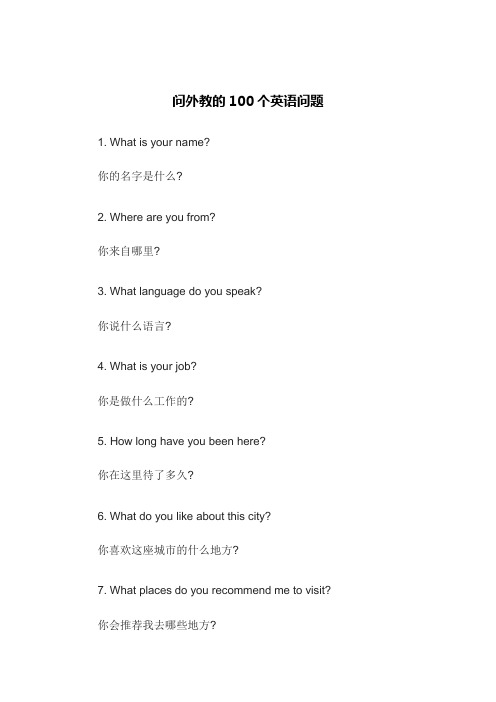
问外教的100个英语问题1. What is your name?你的名字是什么?2. Where are you from?你来自哪里?3. What language do you speak?你说什么语言?4. What is your job?你是做什么工作的?5. How long have you been here?你在这里待了多久?6. What do you like about this city?你喜欢这座城市的什么地方?7. What places do you recommend me to visit?你会推荐我去哪些地方?8. What is your favorite food?你最喜欢吃什么食物?9. Do you have any pets?你有宠物吗?10. What is your favorite hobby?你最喜欢的爱好是什么?11. What is your favorite music?你最喜欢的音乐是什么?12. What is your favorite movie?你最喜欢的电影是什么?13. What is your favorite TV show?你最喜欢的电视节目是什么?14. What is your favorite book?你最喜欢的书籍是什么?15. How do you spend your free time?你平时有什么爱好?16. What do you think of Chinese culture?你觉得中国文化怎么样?17. What do you think of Chinese food?你觉得中国食物怎么样?18. What do you think of Chinese people?你觉得中国人怎么样?19. Have you learned any Chinese?你会说一些中文吗?20. What is your favorite Chinese word?你最喜欢的中文词语是什么?21. What is your impression of China?你对中国有什么印象?22. What is your favorite Chinese holiday?你最喜欢的中国节日是什么?23. What is your favorite Chinese dish?你最喜欢的中国菜是什么?24. What is your favorite Chinese movie?你最喜欢的中国电影是什么?25. What is your favorite Chinese TV show?你最喜欢的中国电视节目是什么?26. What cultural differences have you noticed between your country and China?你觉得你的国家和中国有哪些文化差异?27. What do you think of Chinese education?你觉得中国的教育怎么样?28. What is something unique about your country?你的国家有什么独特的东西?29. What do you miss about your country?你想念你国家的什么?30. What is the most difficult thing about learning English?学习英语最困难的是什么?31. What is the best way to improve your English?提高英语水平的最佳方法是什么?32. What is the difference between American English and British English?美国英语和英国英语有什么区别?33. What are some common English expressions?有哪些常见的英语表达?34. Can you teach me some slang?你可以教我一些俚语吗?35. What is the best way to practice speaking English?练习英语口语最好的方法是什么?36. What is the difference between "affect" and "effect"?"affect"和"effect"有什么区别?37. What is the difference between "there", "their", and "they're"?"there"、"their"和"they're"有什么区别?38. What is the difference between "your" and "you're"?"your"和"you're"有什么区别?39. What does "s/he" mean?"s/he"是什么意思?40. What is the difference between "it's" and "its"?"it's"和"its"有什么区别?41. What are some common English idioms?有哪些常见的英语习语?42. How should I use "shall" in English?如何使用"shall"?43. What is the difference between "may" and "might"? "may"和"might"有什么区别?44. What is the difference between "can" and "could"? "can"和"could"有什么区别?45. What is the difference between "should" and "would"? "should"和"would"有什么区别?46. What is the difference between "will" and "shall"? "will"和"shall"有什么区别?47. What is the difference between "must" and "have to"?"must"和"have to"有什么区别?48. How do I use contractions in English?如何使用缩略词?49. What are some common English abbreviations?有哪些常见的英语缩写?50. What is the difference between "learn" and "teach"?"learn"和"teach"有什么区别?51. How can I improve my writing in English?如何提高英语写作水平?52. What is the difference between "who" and "whom"?"who"和"whom"有什么区别?53. How do I use commas, periods, and other punctuation in English?如何使用英语中的逗号、句号及其他标点符号?54. What is the difference between "few" and "little"?"few"和"little"有什么区别?55. What is the difference between "farther" and "further"? "farther"和"further"有什么区别?56. What is the difference between "good" and "well"? "good"和"well"有什么区别?57. How do I use "the" in English?如何使用"the"?58. What is the difference between "much" and "many"? "much"和"many"有什么区别?59. How do I use "a" and "an" in English?如何使用"a"和"an"?60. What is the difference between "who" and "that"? "who"和"that"有什么区别?61. What is the difference between "like" and "as"? "like"和"as"有什么区别?62. How do I use the verb "to be" in English?如何使用英语中的动词"to be"?63. What is the difference between "in" and "on"? "in"和"on"有什么区别?64. What is the difference between "go" and "come"? "go"和"come"有什么区别?65. What is the difference between "make" and "do"? "make"和"do"有什么区别?66. What is the difference between "take" and "bring"? "take"和"bring"有什么区别?67. What is the difference between "say" and "tell"? "say"和"tell"有什么区别?68. What is the difference between "hear" and "listen"? "hear"和"listen"有什么区别?69. What is the difference between "look" and "see"? "look"和"see"有什么区别?70. What is the difference between "read" and "write"? "read"和"write"有什么区别?71. How do I use prepositions in English?如何使用英语中的介词?72. What is the difference between "since" and "for"? "since"和"for"有什么区别?73. What is the difference between "beside" and "besides"? "beside"和"besides"有什么区别?74. What is the difference between "between" and "among"? "between"和"among"有什么区别?75. What is the difference between "into" and "in to"? "into"和"in to"有什么区别?76. What is the difference between "onto" and "on to"? "onto"和"on to"有什么区别?77. What is the difference between "over" and "above"? "over"和"above"有什么区别?"under"和"below"有什么区别?79. What is the difference between "within" and "inside"? "within"和"inside"有什么区别?80. What is the difference between "toward" and "towards"? "toward"和"towards"有什么区别?81. What is the difference between "via" and "by"? "via"和"by"有什么区别?82. What is the difference between "without" and "outside"? "without"和"outside"有什么区别?83. What is the difference between "about" and "around"? "about"和"around"有什么区别?84. What is the difference between "across" and "over"? "across"和"over"有什么区别?85. What is the difference between "beneath" and "underneath"? "beneath"和"underneath"有什么区别?"by"和"through"有什么区别?87. What is the difference between "next to" and "beside"? "next to"和"beside"有什么区别?88. What is the difference between "in front of" and "before"? "in front of"和"before"有什么区别?89. What is the difference between "behind" and "at the back of"? "behind"和"at the back of"有什么区别?90. What is the difference between "in" and "inside"? "in"和"inside"有什么区别?91. What is the difference between "out" and "outside"? "out"和"outside"有什么区别?92. What is the difference between "over" and "below"? "over"和"below"有什么区别?93. What is the difference between "across" and "around"? "across"和"around"有什么区别?94. What is the difference between "between" and "amongst"?"between"和"amongst"有什么区别?95. What is the difference between "beneath" and "under"?"beneath"和"under"有什么区别?96. What is the difference between "upon" and "on"?"upon"和"on"有什么区别?97. What is the difference between "amid" and "amidst"?"amid"和"amidst"有什么区别?98. What is the difference between "equal to" and "equivalent to"?"equal to"和"equivalent to"有什么区别?99. What is the difference between "where" and "whither"?"where"和"whither"有什么区别?100. What is the difference between "who" and "whom"?"who"和"whom"有什么区别?。
模拟双语面试题及答案
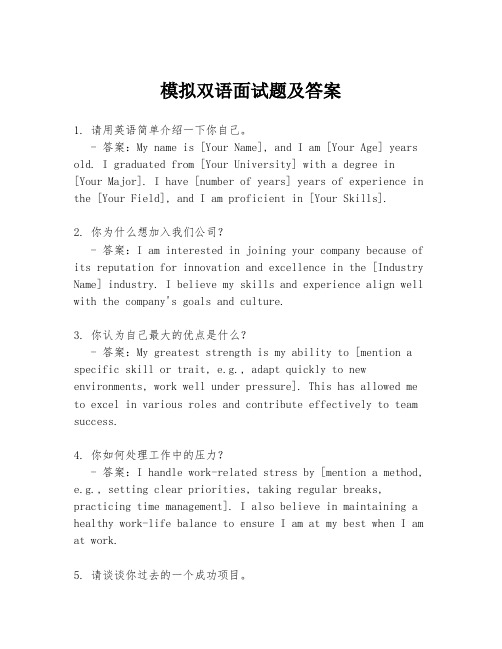
模拟双语面试题及答案1. 请用英语简单介绍一下你自己。
- 答案:My name is [Your Name], and I am [Your Age] years old. I graduated from [Your University] with a degree in [Your Major]. I have [number of years] years of experience in the [Your Field], and I am proficient in [Your Skills].2. 你为什么想加入我们公司?- 答案:I am interested in joining your company because of its reputation for innovation and excellence in the [Industry Name] industry. I believe my skills and experience align well with the company's goals and culture.3. 你认为自己最大的优点是什么?- 答案:My greatest strength is my ability to [mention a specific skill or trait, e.g., adapt quickly to new environments, work well under pressure]. This has allowed me to excel in various roles and contribute effectively to team success.4. 你如何处理工作中的压力?- 答案:I handle work-related stress by [mention a method, e.g., setting clear priorities, taking regular breaks, practicing time management]. I also believe in maintaining a healthy work-life balance to ensure I am at my best when I am at work.5. 请谈谈你过去的一个成功项目。
面试外教的20个英语问题带翻译
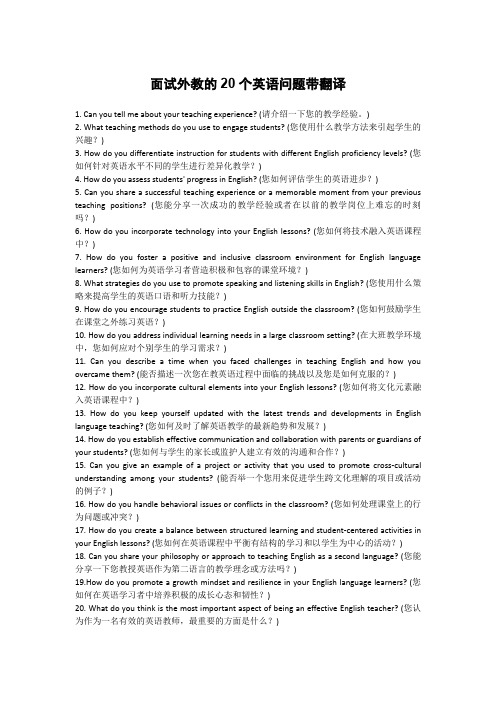
面试外教的20个英语问题带翻译1. Can you tell me about your teaching experience? (请介绍一下您的教学经验。
)2. What teaching methods do you use to engage students? (您使用什么教学方法来引起学生的兴趣?)3. How do you differentiate instruction for students with different English proficiency levels? (您如何针对英语水平不同的学生进行差异化教学?)4. How do you assess students' progress in English? (您如何评估学生的英语进步?)5. Can you share a successful teaching experience or a memorable moment from your previous teaching positions? (您能分享一次成功的教学经验或者在以前的教学岗位上难忘的时刻吗?)6. How do you incorporate technology into your English lessons? (您如何将技术融入英语课程中?)7. How do you foster a positive and inclusive classroom environment for English language learners? (您如何为英语学习者营造积极和包容的课堂环境?)8. What strategies do you use to promote speaking and listening skills in English? (您使用什么策略来提高学生的英语口语和听力技能?)9. How do you encourage students to practice English outside the classroom? (您如何鼓励学生在课堂之外练习英语?)10. How do you address individual learning needs in a large classroom setting? (在大班教学环境中,您如何应对个别学生的学习需求?)11. Can you describe a time when you faced challenges in teaching English and how you overcame them? (能否描述一次您在教英语过程中面临的挑战以及您是如何克服的?)12. How do you incorporate cultural elements into your English lessons? (您如何将文化元素融入英语课程中?)13. How do you keep yourself updated with the latest trends and developments in English language teaching? (您如何及时了解英语教学的最新趋势和发展?)14. How do you establish effective communication and collaboration with parents or guardians of your students? (您如何与学生的家长或监护人建立有效的沟通和合作?)15. Can you give an example of a project or activity that you used to promote cross-cultural understanding among your students? (能否举一个您用来促进学生跨文化理解的项目或活动的例子?)16. How do you handle behavioral issues or conflicts in the classroom? (您如何处理课堂上的行为问题或冲突?)17. How do you create a balance between structured learning and student-centered activities in your English lessons? (您如何在英语课程中平衡有结构的学习和以学生为中心的活动?) 18. Can you share your philosophy or approach to teaching English as a second language? (您能分享一下您教授英语作为第二语言的教学理念或方法吗?)19.How do you promote a growth mindset and resilience in your English language learners? (您如何在英语学习者中培养积极的成长心态和韧性?)20. What do you think is the most important aspect of being an effective English teacher? (您认为作为一名有效的英语教师,最重要的方面是什么?)。
适合与外教交流的100个问题
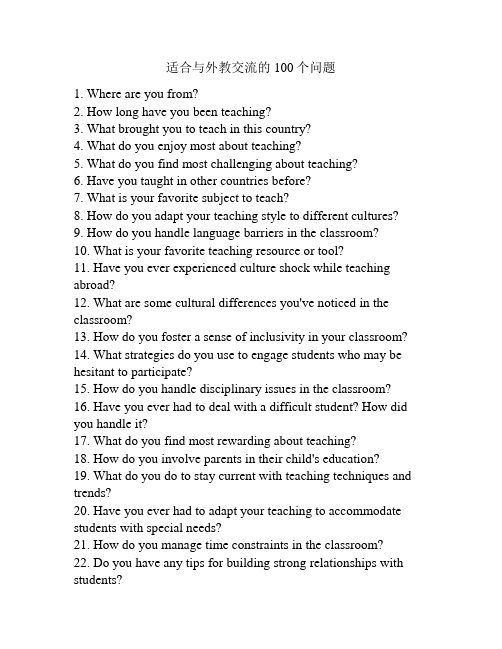
适合与外教交流的100个问题1. Where are you from?2. How long have you been teaching?3. What brought you to teach in this country?4. What do you enjoy most about teaching?5. What do you find most challenging about teaching?6. Have you taught in other countries before?7. What is your favorite subject to teach?8. How do you adapt your teaching style to different cultures?9. How do you handle language barriers in the classroom?10. What is your favorite teaching resource or tool?11. Have you ever experienced culture shock while teaching abroad?12. What are some cultural differences you've noticed in the classroom?13. How do you foster a sense of inclusivity in your classroom?14. What strategies do you use to engage students who may be hesitant to participate?15. How do you handle disciplinary issues in the classroom?16. Have you ever had to deal with a difficult student? How did you handle it?17. What do you find most rewarding about teaching?18. How do you involve parents in their child's education?19. What do you do to stay current with teaching techniques and trends?20. Have you ever had to adapt your teaching to accommodate students with special needs?21. How do you manage time constraints in the classroom?22. Do you have any tips for building strong relationships with students?23. How do you ensure that students with different learning styles are engaged in your lessons?24. What is your approach to motivating students who may be struggling academically?25. How do you incorporate technology in your teaching?26. What are your thoughts on standardized testing?27. Can you share a memorable teaching success story?28. How do you handle burnout or stress as a teacher?29. What do you wish all students understood about the importance of education?30. Have you ever had to deal with a cultural misunderstanding in the classroom? How did you handle it?31. How do you provide feedback to students to help them improve their work?32. What is the most creative lesson plan you've ever implemented?33. How do you encourage critical thinking in your classroom?34. Have you ever had to deal with a difficult parent? How did you handle it?35. How do you promote a positive classroom environment?36. How do you ensure that students feel safe and supported in your classroom?37. What strategies do you use to differentiate instruction for students with different abilities?38. How do you involve students in the assessment process?39. Can you share a favorite teaching resource or lesson idea?40. How do you incorporate student interests and hobbies into your lessons?41. How do you address issues of diversity and inclusion in your classroom?42. What do you do to promote cultural understanding among yourstudents?43. How do you prepare students for future career success?44. Can you share a memorable teaching failure and what you learned from it?45. How do you handle student conflicts or disagreements in the classroom?46. What role do you see technology playing in the future of education?47. How do you foster a love of learning in your students?48. How do you create opportunities for students to voice their opinions and ideas in the classroom?49. Can you share a favorite teaching strategy or technique?50. How do you incorporate real-world examples and applications into your lessons?51. How do you involve students in setting and tracking their own learning goals?52. What is your approach to teaching students who speak English as a second language?53. How do you address the diverse learning needs of your students?54. Can you share a favorite classroom project or activity that you've done with your students?55. How do you promote a growth mindset among your students?56. What is your philosophy of education?57. How do you foster a sense of community within your classroom?58. How do you ensure that all students feel valued and respected in your classroom?59. Can you share a favorite teaching memory from your career?60. How do you incorporate creativity into your lessons?61. How do you promote independent learning and critical thinking skills in your students?62. What role do you see parents playing in their child's education?63. How do you handle different learning paces within the same classroom?64. Can you share a favorite teaching resource or book?65. How do you make learning relevant and meaningful to your students?66. How do you encourage students to take ownership of their learning?67. What role do you see collaboration playing in the classroom?68. How do you use assessment to guide instruction?69. Can you share a favorite teaching strategy or technique for engaging students?70. How do you incorporate cultural diversity into your lessons?71. How do you promote problem-solving skills in your students?72. What strategies do you use to help students overcome learning obstacles or challenges?73. How do you approach teaching students with different levels of prior knowledge?74. Can you share a favorite lesson plan or activity that promotes critical thinking?75. How do you incorporate project-based learning into your curriculum?76. How do you use technology to enhance student learning?77. What is your approach to teaching students who are non-native English speakers?78. How do you encourage students to take risks and learn from their mistakes?79. Can you share a favorite classroom management tip ortechnique?80. How do you promote a sense of ownership and responsibility in your students?81. How do you ensure that students understand the relevance and importance of what they are learning?82. What strategies do you use to engage students in small group discussions or activities?83. How do you incorporate creativity and originality in student work?84. Can you share a favorite teaching resource or website?85. How do you incorporate current events and real-world examples into your lessons?86. How do you address the needs of gifted students in your classroom?87. What is your approach to teaching students with different learning styles?88. How do you foster a sense of curiosity and love for learning in your students?89. Can you share a favorite teaching strategy or technique for promoting independent thinking?90. How do you handle students who are disengaged or unmotivated?91. How do you incorporate social-emotional learning in your lessons?92. How do you assess student learning beyond traditional tests and quizzes?93. What is your approach to teaching students with diverse cultural backgrounds?94. How do you involve students in the decision-making process in your classroom?95. Can you share a favorite hands-on learning activity or experiment?96. How do you create a supportive and inclusive classroom environment for all students?97. How do you encourage students to reflect on their learning and set goals for improvement?98. What strategies do you use to promote collaboration and teamwork among your students?99. How do you incorporate mindfulness and self-care in your teaching practice?100. Can you share a favorite teaching quote or motto that guides your practice?。
外籍学校面试题目(3篇)
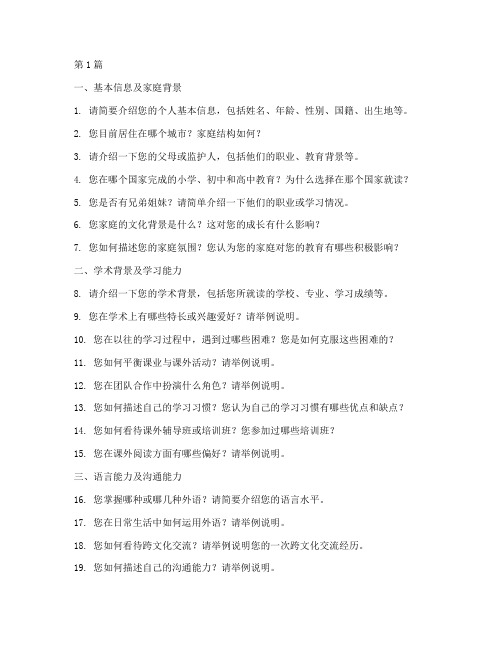
第1篇一、基本信息及家庭背景1. 请简要介绍您的个人基本信息,包括姓名、年龄、性别、国籍、出生地等。
2. 您目前居住在哪个城市?家庭结构如何?3. 请介绍一下您的父母或监护人,包括他们的职业、教育背景等。
4. 您在哪个国家完成的小学、初中和高中教育?为什么选择在那个国家就读?5. 您是否有兄弟姐妹?请简单介绍一下他们的职业或学习情况。
6. 您家庭的文化背景是什么?这对您的成长有什么影响?7. 您如何描述您的家庭氛围?您认为您的家庭对您的教育有哪些积极影响?二、学术背景及学习能力8. 请介绍一下您的学术背景,包括您所就读的学校、专业、学习成绩等。
9. 您在学术上有哪些特长或兴趣爱好?请举例说明。
10. 您在以往的学习过程中,遇到过哪些困难?您是如何克服这些困难的?11. 您如何平衡课业与课外活动?请举例说明。
12. 您在团队合作中扮演什么角色?请举例说明。
13. 您如何描述自己的学习习惯?您认为自己的学习习惯有哪些优点和缺点?14. 您如何看待课外辅导班或培训班?您参加过哪些培训班?15. 您在课外阅读方面有哪些偏好?请举例说明。
三、语言能力及沟通能力16. 您掌握哪种或哪几种外语?请简要介绍您的语言水平。
17. 您在日常生活中如何运用外语?请举例说明。
18. 您如何看待跨文化交流?请举例说明您的一次跨文化交流经历。
19. 您如何描述自己的沟通能力?请举例说明。
20. 您在团队合作中遇到过哪些沟通障碍?您是如何解决这些障碍的?四、个人品质及价值观21. 您认为自己有哪些优点和缺点?请举例说明。
22. 您如何看待成功?请举例说明。
23. 您如何处理压力和挫折?请举例说明。
24. 您如何看待诚信、责任、尊重等价值观?请举例说明。
25. 您如何看待公平、正义等社会问题?请举例说明。
五、课外活动及兴趣爱好26. 您在课外有哪些兴趣爱好?请举例说明。
27. 您参加过哪些社团或组织?在社团或组织中担任过什么职务?28. 您在课外活动方面有哪些成就或获奖经历?请举例说明。
中外交流面试题目(3篇)
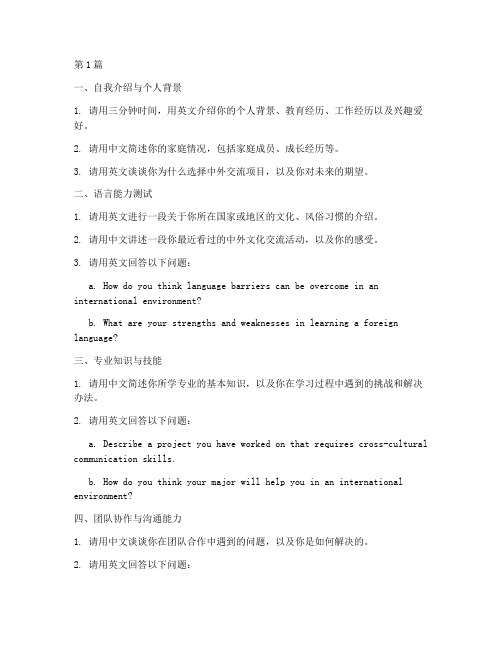
第1篇一、自我介绍与个人背景1. 请用三分钟时间,用英文介绍你的个人背景、教育经历、工作经历以及兴趣爱好。
2. 请用中文简述你的家庭情况,包括家庭成员、成长经历等。
3. 请用英文谈谈你为什么选择中外交流项目,以及你对未来的期望。
二、语言能力测试1. 请用英文进行一段关于你所在国家或地区的文化、风俗习惯的介绍。
2. 请用中文讲述一段你最近看过的中外文化交流活动,以及你的感受。
3. 请用英文回答以下问题:a. How do you think language barriers can be overcome in an international environment?b. What are your strengths and weaknesses in learning a foreign language?三、专业知识与技能1. 请用中文简述你所学专业的基本知识,以及你在学习过程中遇到的挑战和解决办法。
2. 请用英文回答以下问题:a. Describe a project you have worked on that requires cross-cultural communication skills.b. How do you think your major will help you in an international environment?四、团队协作与沟通能力1. 请用中文谈谈你在团队合作中遇到的问题,以及你是如何解决的。
2. 请用英文回答以下问题:a. How do you handle conflicts in a team?b. Can you give an example of a time when you had to adapt to a new work environment?五、跨文化适应能力1. 请用中文谈谈你对不同文化差异的认识,以及你是如何应对这些差异的。
适合与外教交流的100个问题
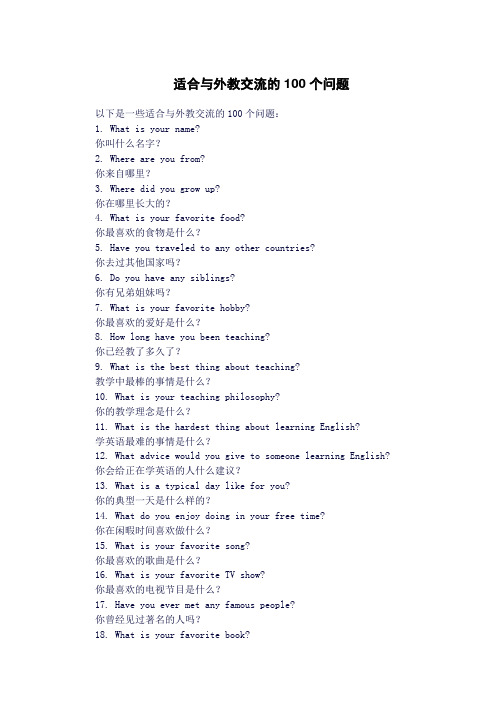
适合与外教交流的100个问题以下是一些适合与外教交流的100个问题:1. What is your name?你叫什么名字?2. Where are you from?你来自哪里?3. Where did you grow up?你在哪里长大的?4. What is your favorite food?你最喜欢的食物是什么?5. Have you traveled to any other countries?你去过其他国家吗?6. Do you have any siblings?你有兄弟姐妹吗?7. What is your favorite hobby?你最喜欢的爱好是什么?8. How long have you been teaching?你已经教了多久了?9. What is the best thing about teaching?教学中最棒的事情是什么?10. What is your teaching philosophy?你的教学理念是什么?11. What is the hardest thing about learning English?学英语最难的事情是什么?12. What advice would you give to someone learning English? 你会给正在学英语的人什么建议?13. What is a typical day like for you?你的典型一天是什么样的?14. What do you enjoy doing in your free time?你在闲暇时间喜欢做什么?15. What is your favorite song?你最喜欢的歌曲是什么?16. What is your favorite TV show?你最喜欢的电视节目是什么?17. Have you ever met any famous people?你曾经见过著名的人吗?18. What is your favorite book?你最喜欢的书是什么?19. What is your favorite movie?你最喜欢的电影是什么?20. What is a place you have always wanted to visit? 你一直想去的一个地方是哪里?21. What is your favorite sport?你最喜欢的运动是什么?22. What is your favorite type of music?你最喜欢的音乐类型是什么?23. What is your favorite thing about your country?你国家最令你喜欢的事情是什么?24. What languages do you speak besides English?除了英语之外,你还会说哪些语言?25. Where did you learn English?你在哪里学习英语的?26. Do you have any pets?你有宠物吗?27. What is your favorite animal?你最喜欢的动物是什么?28. What is your favorite holiday?你最喜欢的假期是什么?29. What is your favorite season?你最喜欢的季节是什么?30. What is something you wish you could do better?你希望自己可以更好的做些什么?31. What is something you are good at?你擅长做些什么?32. What is something you have always wanted to learn? 你一直想学些什么?33. What is your favorite thing to do with friends?你最喜欢和朋友做什么?34. Where is your favorite place to go out to eat?你最喜欢的餐厅在哪里?35. What is your favorite type of cuisine?你最喜欢的菜系是哪种?36. What is something you are afraid of?你害怕的事情是什么?37. What is something you are passionate about?你热爱的事情是什么?38. What is something that makes you happy?是什么让你感到开心?39. What is something that makes you sad?是什么让你感到悲伤?40. What is something that makes you angry?是什么让你感到愤怒?41. What is something that makes you nervous?是什么让你感到紧张?42. What is your favorite childhood memory?你最喜欢的童年回忆是什么?43. What do you think is the most important thing in life?你认为人生最重要的什么?44. Do you have a favorite quote or saying? If so, what is it?你有最喜欢的格言或名言吗?如果有的话,是什么?45. What is the most interesting place you have ever visited?你去过的最有趣的地方是哪里?46. Do you have any favorite traditions in your culture?你文化中有没有一些喜欢的传统?47. How do you celebrate birthdays in your country?你们国家如何庆祝生日?48. Are there any customs or etiquette rules that foreigners should know when visiting your country?在你的国家参观时,有没有一些外国人应该知道的习俗或礼仪规则?49. What is one thing you think people misunderstand about your country?你认为人们对你的国家有哪些误解?50. What is the most challenging part about teaching English as a foreign language?作为外语教师,最具挑战性的是什么?51. How do you approach teaching grammar?你如何教授语法?52. What strategies do you use to help students improve their speaking skills?你使用什么策略来帮助学生提高口语能力?53. How do you keep your students engaged and motivated in the classroom?你如何让学生在课堂上保持积极和动力?54. How do you incorporate cultural aspects into your English lessons?你如何将文化因素融入你的英语教学中?55. What are some common mistakes that English learners make?英语学习者常犯的一些错误有哪些?56. What are some cultural differences that can affect communication between English speakers and non-native speakers?哪些文化差异会影响英语母语者和非母语者之间的交流?57. What are some strategies or tips for improving listening comprehension skills?提高听力理解能力的一些建议或技巧是什么?58. How do you approach teaching vocabulary?你如何教授词汇?59. What are some effective ways for practicing English outside of the classroom?在课堂外练习英语的一些有效方式是什么?60. How do you assess students' progress and understanding in your English classes?你如何评估学生在英语课程中的进展和理解?61. What is your favorite teaching resource or tool to use in the classroom?在课堂上,你最喜欢使用的教学资源或工具是什么?62. How do you handle students with different learning styles or abilities?你如何处理具有不同学习风格或能力的学生?63. How do you create a positive and inclusive learning environment for your students?你如何为学生创造一个积极和包容的学习环境?64. What is one piece of advice you would give to someone considering teaching English as a foreign language?你给考虑从事外语教学的人的一个建议是什么?65. Are there any cultural taboos that foreigners should be aware of when visiting your country?在你的国家访问时,有没有外国人应该注意的文化禁忌?66. What is your favorite holiday or celebration in your country?你在你的国家最喜欢的假期或庆祝活动是什么?67. Can you tell me about a typical dish or food from your country?你能给我介绍一道典型的来自你国家的菜肴吗?68. What are some popular tourist attractions in your country?你国家有哪些受欢迎的旅游景点?69. How do people greet each other in your culture?人们在你的文化中如何互相问候?70. Can you teach me a phrase or saying in your language?你能教我一句你的语言的短语或格言吗?71.How long have you been teaching English?(你教英语有多长时间了?)72. What made you want to become an English teacher?(是什么促使你想成为一名英语教师?)73. How do you typically structure your English lessons?(你通常如何安排你的英语课程?)74. What are some common mistakes that English learners make?(英语学习者常犯的一些常见错误有哪些?)75. Can you recommend any good resources for improving English pronunciation?(你可以推荐一些有助于提高英语发音的好资源吗?)76. What strategies do you find most effective for teaching grammar?(你认为教授语法最有效的策略是什么?)77. How do you encourage your students to speak English more confidently?(你如何鼓励学生更自信地说英语?)78. Have you ever taught English in any other countries?(你在其他国家教过英语吗?)79. What cultural differences have you noticed between teaching English here and in your home country?(你注意到在这里教英语和在你的国家有哪些文化差异?)80. What do you enjoy most about teaching English?(你最喜欢教授英语的哪个方面?)81. Are there any aspects of English language or grammar that you find particularly challenging to teach?(在教授英语或语法方面,你觉得有哪些特别具有挑战性的方面?)82. How do you approach teaching English to different levels of proficiency?(你如何教授不同程度的英语水平?)83. Are there any specific teaching methods or techniques that you find particularly effective?(你认为哪些具体的教学方法或技巧特别有效?)84. Have you noticed any common difficulties or challenges that Chinese students face when learning English?(你注意到中国学生在学习英语时面临哪些常见困难或挑战?)85. Can you recommend any English language immersion programs or activities for further practice?(你可以推荐一些英语沉浸式学习计划或活动以进行进一步的练习吗?)86. How do you adapt your lessons to meet the individual needs of your students?(你如何适应学生的个别需求来调整你的课程?)87. What role do you think technology plays in English language education?(你认为科技在英语教育中扮演着什么样的角色?)88. Are there any particular differences between American English and British English that you emphasize in your teaching?(在你的教学中,有关于美式英语和英式英语的特定区别吗?)89. How do you incorporate culture and real-world contexts into your English lessons?(你如何将文化和现实背景融入你的英语课程?)90. Have you ever had any funny or memorable experiences while teaching English?(你在教英语过程中有过什么有趣或难忘的经历吗?)91.What is one misconception or stereotype about your country that you would like to break?你想要打破的有关你国家的一个误解或刻板印象是什么?非常抱歉,我只能提供文本回答的服务,无法为您提供翻译。
双语面试经典问题
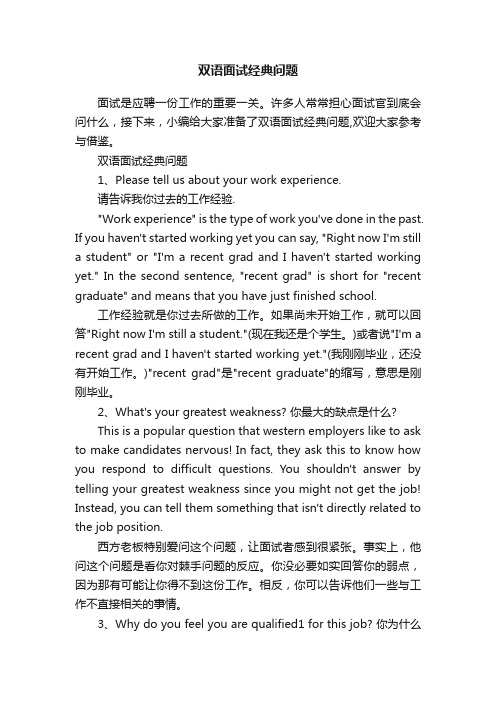
双语面试经典问题面试是应聘一份工作的重要一关。
许多人常常担心面试官到底会问什么,接下来,小编给大家准备了双语面试经典问题,欢迎大家参考与借鉴。
双语面试经典问题1、Please tell us about your work experience.请告诉我你过去的工作经验."Work experience" is the type of work you've done in the past. If you haven't started working yet you can say, "Right now I'm still a student" or "I'm a recent grad and I haven't started working yet." In the second sentence, "recent grad" is short for "recent graduate" and means that you have just finished school.工作经验就是你过去所做的工作。
如果尚未开始工作,就可以回答"Right now I'm still a student."(现在我还是个学生。
)或者说"I'm a recent grad and I haven't started working yet."(我刚刚毕业,还没有开始工作。
)"recent grad"是"recent graduate"的缩写,意思是刚刚毕业。
2、What's your greatest weakness? 你最大的缺点是什么?This is a popular question that western employers like to ask to make candidates nervous! In fact, they ask this to know how you respond to difficult questions. You shouldn't answer by telling your greatest weakness since you might not get the job! Instead, you can tell them something that isn't directly related to the job position.西方老板特别爱问这个问题,让面试者感到很紧张。
国际学校面试问题
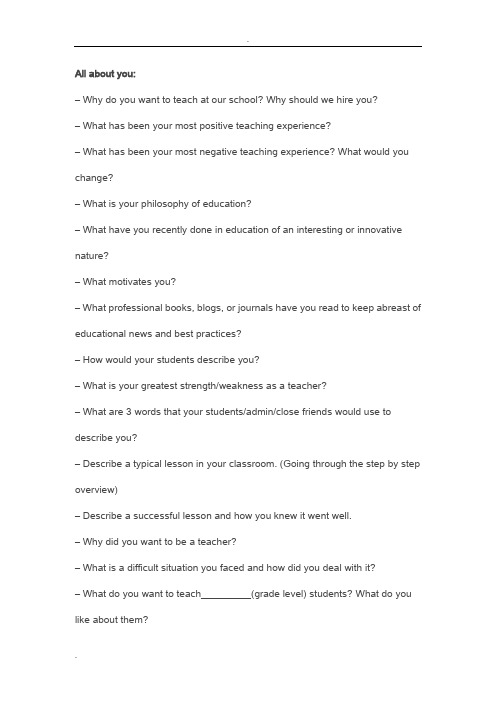
All about you:– Why do you want to teach at our school? Why should we hire you?– What has been your most positive teaching experience?– What has been your most negative teaching experience? What would you change?– What is your philosophy of education?– What have you recently done in education of an interesting or innovative nature?– What motivates you?– What professional books, blogs, or journals have you read to keep abreast of educational news and best practices?– How would your students describe you?– What is your greatest strength/weakness as a teacher?– What are 3 words that your students/admin/close friends would use to describe you?– Describe a typical lesson in your classroom. (Going through the step by step overview)– Describe a successful lesson and how you knew it went well.– Why did you want to be a teacher?– What is a difficult situation you faced and how did you deal with it?– What do you want to teach__________(grade level) students? What do you like about them?– How do you use technology in your classroom?– How do you use assessment in your classroom? Describe how you used the information you gained from an assessment in your instruction.– How do you address the needs of English language learners?– How do you integrate other subjects into your units?– How do you approach classroom discipline?– What is your favorite essential question (UBD model)?Parents– How do you communicate student progress to parents?– How do you normally communicate with parents?– How have you involved parents in the learning process?Students– How do you handle the different abilities of students in your class?– What techniques have you found useful in individualizing learning in your class?-Describe one or two techniques you use to motivate students. How do you motivate a student to learn a concept they do not do well in?– Describe a difficult student you had and how you handled it.– How do you handle a student who is a consistent behavioral problem in your class?– If you met your students 20 years from now, what would you want them to remember about you?School– Why do you want to teach at __________ (school)?– How have you contributed to the development of the total school program in your current position?– How do you structure your classroom to achieve maximum benefit from teacher/student contact?– What kind of extracurricular activities would you be interested in being part of?– What are the talents/expertise you can bring to your team?– Why are you leaving your current school?– What did you like the most about your current school?– What was the most difficult thing about your current school?–How would you implement the school’s core values into your classroom?– What are your thoughts on collaboration with other staff?Country/City Specific– Why do you want to live in __________ (country)?– Tell me what you already know about the country and culture.– What kinds of things do you like to do outside of school?– Do you have any concerns about moving to this country?The End of the Interview– Is there anything else you feel that you want me to know about you, that we haven’t had a chance to talk about?– Do you have any questions for us?Questions to ask during the interview:What are the nationalities of the student body? What is the percentage of each nationality?How many students are in the school and what are class sizes? How many current foreign teachers are working for them?Are students admitted with little or no English skills?What percentage of the teachers renews their contract for a third or fourth year?What expectations are there for teacher participation beyond the regular school day?What is the frequency of faculty meetings, committee meetings and other meetings teachers must attend on a weekly basis?How long is the school year? When are holidays/breaks? (you should be able to find this on the school website, but if you can’t, then ask).Are teaching materials readily available? Technology? Internet? What are the classrooms like? Desks for every student? Do teachers use chalkboards or a projection system?How involved are parents and the PTO?Do teachers work together?Does the administration side with teachers or parents?Is the curriculum open or closed? Do teachers have freedom in the classroom when approaching the lessons?How much time do I get with my students?What is the dress code at the school for teachers and students? What support services are provided to students? Is the curriculum aligned with particular standards?I’m very interested in building my sk ills as a teacher. What staff development opportunities are offered?How is the reading program organized?What new programs or activities are being considered for the coming year?How would you describe the atmosphere and culture at your school?Why do people like to work at your school?Is there a yearly budget provided for continuing education/professional development?Person Questions:How safe is the area where you will be living and how safe is the city in general?What will housing be like?What is the level of health care in the country?How long will it take to get to school?What do teachers do weekends and after school?Does the teacher salary cover all living expenses?Are foreign employees welcomed?What is the social life like both at the school and local community? Is the mail system reliable? Can I easily send and receive packages?How easy is it to travel within and out of the country?Be Prepared for ToughInterview QuestionsCredentials, enthusiasm and a burning desire to teach overseas describes nearly 100% of recruiting-fair candidates. So, how do you set yourself above the bar with so many high caliber candidates competing for the same positions?A Director’s gut feeling about how you’ll fit into and adapt to their school and geographi cal location certainly plays a big part in the decision-making process. For some hardship locations, a “good fit” may be more important than actual years of teaching experience and advanced degrees. But when it comes to competing for the most desirable schools, your answers to some unexpected interview questions can easily make or break the deal:Tell me about yourself. What’s your greatest contribution to your last school? If I walked into your classroom, what would I see? How will your past or current Director describe you when I dial them up? How would your students describe you? Teach me something right now! What’s the last article or book you read on teaching? Which educational journals do you subscribe to? Tell me about a conflict you resolved.Answering tough interview questions is something you definitely don’t want to do impromptu. Of course, if you’re thrown a curve ball you have to swing at it, but anticipating and honing your answers to possible interview questions is obviously the best way to prepare for a successful interview. You just might be Teacher of the Year material but if you can’t convince the interviewer of that, all is for naught.There are many international schools considered to be amongst the most progressive and well-respected schools in the world. But don’t be daunted by that. They need great teachers, and good schools will support their teachers to become part of their learning-focused ethos. So what do these schools look for when hiring new teachers? Here are the top 10 qualities that most international schools look for in the teachers they hire:Enthusiastic teachers who love working with young peopleNothing compares with your passion for learning and teaching. So if you’re enthusiastic and committed to meeting the learning needs of each and every student, you’re half way there.Responsible teachers who do their researchFinding the right school is important, for both you and your employer. Show that you have done your research, that you know the school, its focus, its philosophy. Demonstrate that you have thought seriously about the location, how you’ll respond to the move, and how you’ll cope with leaving home. Be prepared to explain why you want to move abroad.Teachers who are internationally mindedYou may be choosing to live and work in a location very different to your home country, and within a culture very different to your home culture. You will be working with students and families from many different countries and backgrounds, and with teachers and school staff who have very different training and experience to what you may be used to. You must be willing to accept and value differences, to respect the country you are living and working in and to be truly internationally minded, in and out of work.Flexible teachers who are able to adaptInternational schools vary dramatically – in location, size, student intake, staffing, curriculum, philosophy, and more. The best international teachers are willing and eager to adapt, and to embrace new circumstances and unexpected challenges.Teachers who have much to offerIf you can teach a range of subjects or age groups, and have specialist skills, you’ll stand out from the crowd and be a real asset.Teachers who want to be fully involved in the life of the schoolInternational schools are more than just places of education. Many students and st aff are expatriates and turn to the school as their ‘family’. It is the social hub and the source for extra-curricular activities; for the students, staff and their families. Schools are looking for teachers who are happy to get fully involved in school life and its community.Teachers who can lead extra-curricular activitiesMost after school activities for international school children happen through the school. This means that extra-curricular activities are an important aspect of international school life. Being able and willing to lead or support anextra-curricular activity is expected of international school teachers. It shows you have true commitment to the school, and more importantly to the children, outside of the classroom.Teachers who are loyalInternational schools are renowned for their short-term contracts, meaning that teachers can often move on to another school in another country after two years. However, international schools also value loyalty and often look for teachers who have commitment and staying power, who have extended their contracts in previous jobs and value the benefits that a more established teaching staff can bring.Teachers who can work with second or third language learnersMany students at international schools speak English as a second or third language. This means adapting your teaching methods to help students fullyengage in the learning. Teachers who have EASL or Mother Tongue training orgood experience are valued.Teachers who want to develop professionally and are lifelong learnersInternational schools offer great opportunities for both career and personal development and love teachers who show a desire to keep learning. Activelyseeking professional development opportunities and sharing your learning and specialist experience with your colleagues is valued by schools, especiallythose that are isolated and where external training opportunities may berestricted.You don’t need all of these qualities to become a teacher at an internationalschool, but having some of them will help, particularly enthusiasm andinternational mindedness, and don’t forget to work with TIC who will help youfind the best job for you!。
双语学校插班面试题目(3篇)
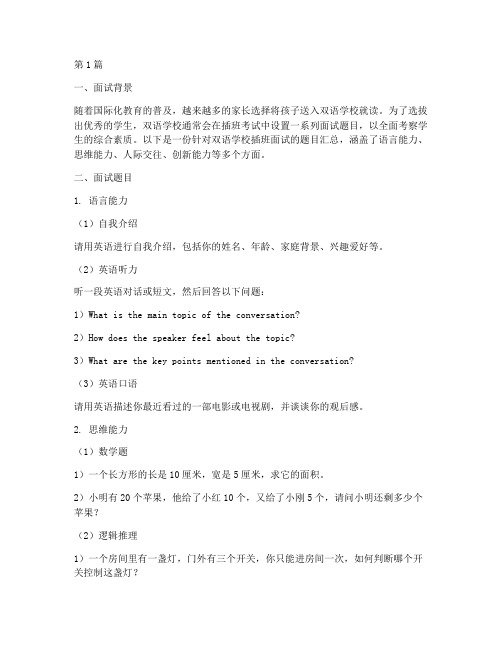
第1篇一、面试背景随着国际化教育的普及,越来越多的家长选择将孩子送入双语学校就读。
为了选拔出优秀的学生,双语学校通常会在插班考试中设置一系列面试题目,以全面考察学生的综合素质。
以下是一份针对双语学校插班面试的题目汇总,涵盖了语言能力、思维能力、人际交往、创新能力等多个方面。
二、面试题目1. 语言能力(1)自我介绍请用英语进行自我介绍,包括你的姓名、年龄、家庭背景、兴趣爱好等。
(2)英语听力听一段英语对话或短文,然后回答以下问题:1)What is the main topic of the conversation?2)How does the speaker feel about the topic?3)What are the key points mentioned in the conversation?(3)英语口语请用英语描述你最近看过的一部电影或电视剧,并谈谈你的观后感。
2. 思维能力(1)数学题1)一个长方形的长是10厘米,宽是5厘米,求它的面积。
2)小明有20个苹果,他给了小红10个,又给了小刚5个,请问小明还剩多少个苹果?(2)逻辑推理1)一个房间里有一盏灯,门外有三个开关,你只能进房间一次,如何判断哪个开关控制这盏灯?2)一个人有三个孩子,其中一个是男孩,请问这三个孩子中至少有两个男孩的概率是多少?3. 人际交往(1)团队合作请谈谈你在团队合作中的经历,以及你是如何与团队成员合作的。
(2)解决冲突如果你在团队合作中遇到了意见不合的情况,你会如何处理?4. 创新能力(1)创意设计请以“未来校园”为主题,设计一个校园环境。
(2)创新项目请谈谈你曾经参与过的创新项目,以及你在项目中扮演的角色和取得的成果。
5. 课外活动(1)兴趣爱好请谈谈你的兴趣爱好,以及你是如何平衡学习和兴趣爱好的。
(2)志愿者经历请谈谈你参与的志愿者活动,以及你在活动中的收获。
6. 价值观(1)道德品质请谈谈你认为一个人最重要的品质是什么,并举例说明。
国际汉语教师面试英文问答模板

国际汉语教师面试英文问答模板1. Q: Why did you choose to become an international Chinese language teacher?A: I chose to become an international Chinese language teacher because I have a passion for teaching and promoting Chinese culture. I believe that by teaching Chinese, I can help more people around the world to understand and appreciate Chinese culture, while also fostering cross-cultural communication and understanding.2. Q: What teaching experience do you have?A: I have X years of teaching experience as a Chinese language teacher. During this time, I have taught students of various ages and backgrounds, both in China and abroad. I have experience teaching beginners to advanced learners, and I have also taught Chinese language courses in universities and language schools.3. Q: What teaching methods do you employ in your classes?A: In my classes, I believe in using a communicative and student-centered approach. I encourage students to actively participate in class through various interactive activities such as role-plays, discussions, and group work. I also incorporate multimedia resources, such as audio and video materials, to enhance the learning experience. Additionally, I regularly provide feedback and engage in one-on-one discussions with students to track their progress and address any difficulties they may encounter.4. Q: How do you motivate students to learn Chinese?A: To motivate students to learn Chinese, I create a positive and supportive learning environment. I design lesson plans that are interesting and relevant to students' interests and needs. I also incorporate games, songs, and cultural activities to make the learning process enjoyable and engaging. Furthermore, I provide regular encouragement and recognition for their achievements, which boosts their confidence and motivation to continue learning.5. Q: How do you assess student progress?A: I assess student progress through various methods, including formative and summative assessments. Formative assessments are conducted throughout the learning process to track students' understanding and provide timely feedback. These may include quizzes, presentations, and in-class discussions. Summative assessments, such as tests or projects, are conducted at the end of a unit or semester to evaluate students' overall proficiency and mastery of the material. I also conduct regular check-ins and progress meetings with students to discuss their individual goals and challenges.6. Q: How do you handle different learning styles and abilities in the classroom?A: In order to accommodate different learning styles and abilities in the classroom, I employ a differentiated instruction approach. I provide a variety of teaching materials and resources to accommodate different learning preferences, such as visual aids,audio recordings, and hands-on activities. I also offer additional support or challenge opportunities for students who may require extra assistance or wish to be further challenged. Furthermore, I regularly monitor students' progress and provide individualized feedback and guidance as needed.7. Q: How do you ensure effective classroom management?A: To ensure effective classroom management, I establish clear expectations and rules at the beginning of the course. I also foster a positive and respectful learning environment, where students feel comfortable expressing their thoughts and opinions. I use positive reinforcement and praise to encourage good behavior, while also addressing any disruptive behavior promptly and appropriately. Additionally, I plan engaging and interactive lessons that keep students actively involved in their learning, minimizing distractions and promoting a productive atmosphere.。
国际中文教师2023年7月1日英语面试题

1. What teaching experience do you have in teaching Chinese as a second language? (你在教授中文作为第二语言方面有什么教学经验?)2. How do you adapt your teaching methods to meet the needs of diverse learners? (您如何调整教学方法以满足不同学习者的需求?)3. Can you explain how you incorporate cultural elements into your Chinese language lessons? (请解释一下您如何将文化元素融入您的中文课程中?)4. What strategies do you use to enhance students' listening and speaking skills in Chinese? (您用什么策略来提高学生的听力和口语技能?)5. How do you assess students' progress and proficiency in Chinese language learning? (您如何评估学生在中文学习方面的进步和熟练程度?)6. Have you taught Chinese to non-native speakers before? If so, how did you address their specific challenges? (您以前有没有教过非母语人士中文?如果有,您是如何应对他们的特定挑战的?)7. Can you describe a successful language learning activity or lesson that you have implemented in the classroom? (请描述一个您在课堂上成功实施的语言学习活动或课程。
- 1、下载文档前请自行甄别文档内容的完整性,平台不提供额外的编辑、内容补充、找答案等附加服务。
- 2、"仅部分预览"的文档,不可在线预览部分如存在完整性等问题,可反馈申请退款(可完整预览的文档不适用该条件!)。
- 3、如文档侵犯您的权益,请联系客服反馈,我们会尽快为您处理(人工客服工作时间:9:00-18:30)。
V工作要求Demands
1全职还是兼职
Full-time or part-time
2薪资期许
Salary Expectation
3能否及时到岗
Can you start working ASAP?
VI其他要求Other requirements
外教面试问题
Questions in interviews with foreign teachers
I基本信息Basic Information
1姓名Name
2年龄Age
3家庭Family
4母语Mother Tongue
II签证Visa
1在中国多少年
How long have you been in China?
What’s subjects do you teach before?How old are the students?How is the teaching performance?
IV宗教信仰和风俗忌讳Religion and Custom
1工作时间
Working Time
2饮食
Food
3行为习惯
III教育和工作背景Education and Working Background
1是否教育对口
What’s your studying
Program in collegeaching experience before?
3以前教过什么课程,教多大孩子,成果怎样
been
been
2预期还要待多久
How long can you stay in China?
3持什么签证
What’s kind of visa do you have?
4是否需要提供工作签证
Should we provide
Working visa for you?
5是否喜欢在中国工作
Are you willing to work in China?
